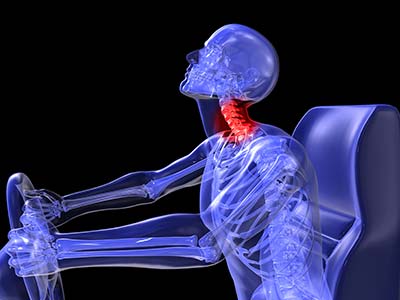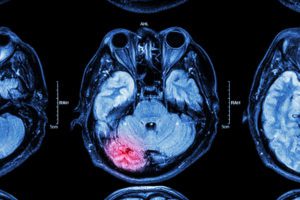The most common injury resulting from car accidents is whiplash, which accounts for 80% of all car crash injuries. Whiplash is considered an acceleration-deceleration injury, which can also include shoulder injuries and traumatic brain injuries.
Rapid acceleration and deceleration in car accidents can be caused in a variety of different ways but most commonly occurs when an abrupt change in speed occurs. This can happen when a driver is parked or stopped and is struck by another vehicle from behind, or when a driver in a moving vehicle collides with another car or stationary object. These types of injuries are very common and typically cause the head, neck, and surrounding muscles to stretch beyond their normal range of motion.
The most extreme cases of whiplash can cause neck fractures, brain injury, and intense pain and are associated with long recovery times.
Acceleration/Deceleration Injury Questions Answered Here
Not ready to speak with a qualified car accident injury lawyer? Read on to gain a better understanding of your best course of action.
Whiplash

Even at a low speed, vehicle occupants can sustain whiplash. Whiplash injuries frequently occur as a result of rear-end collisions, but side-impact and head-on crashes can also cause whiplash.
Car accidents generate kinetic energy, causing the occupants inside the car to move forward. Seat belts and other restraints hold the body stationary, but the head continues to move forward, only to be jerked back into place when the car reaches a stop. Hyperextension injuries result from such an abrupt, unnatural movement.
While whiplash is the most common injury associated with car accidents, it’s often ignored or mistreated. This is because what may first feel like soreness in the neck and shoulders immediately after a car accident can actually be a serious case of whiplash.
When a muscle is “strained” or feels sore, it means the muscle is slightly torn. When a muscle is diagnosed as sprained, it can be either stretched or torn. Most whiplash injuries involve small tears in the neck muscles that can be incredibly painful and temporarily disabling. Often, car accident victims who experience whiplash will also suffer from “myospasm,” or sudden and painful contractions of the neck muscles. Medical experts agree that failure to properly treat whiplash can also lead to chronic psychosocial conditions such as depression and anxiety.
Traumatic Brain Injury

MRI of brain : brain injury
Severe cases of whiplash can lead to traumatic brain injuries. This can happen when whiplash occurs and the brain suffers a sudden and harmful impact against the inside layers of the skull. To determine if a car accident victim has whiplash, they should have both a physical exam and a CT scan or X-ray.
In the most severe cases, traumatic brain injuries can be physically apparent because the victim’s motor skills and speech may be impacted. If the brain swells and bruises, a traumatic brain injury could possibly be life-threatening. Different types of traumatic brain injuries include:
- Concussion – The most common type of traumatic brain injury, concussions are most often caused by whiplash.
- Contusion – Caused as a result of a direct impact to the head, contusions are bruises on the brain. Large contusions may need to be surgically removed.
- Coup-contrecoup – This type of traumatic brain injury is a contusion that occurs both at the site of impact on the opposite side of the brain.
- Diffuse-axonal Injury – This injury can be caused by a strong rotation of the head, such as when produced by the rotational forces of a car accident. This causes extensive tearing of nerve tissue throughout the brain.
- Penetration – This type of injury is caused when fragments or objects force themselves into the brain, and usually signal very violent impact or collision.
Traumatic brain injuries are not just painful but are also costly to treat. These injuries can affect a person’s speech and motor skills, requiring them to undergo extensive therapy to rediscover how to speak or move. Those who suffer a serious case of whiplash can sustain a traumatic brain injury. These injuries are characterized by some of the following symptoms:
- Fatigue
- Headaches or migraines
- Memory issues
- Sleeping problems
- Sound or vision sensitivity
- Being unable to concentrate and pay attention
Shoulder Injury

Shoulder injuries are common for a variety of reasons, mostly because the shoulders contain many small and delicate muscles, bones, nerves, veins, and arteries that all contribute in important ways to make the shoulder move and rotate correctly. The most common type of shoulder injury involves the muscles, tendons, and ligaments. These muscles are injured when whiplash occurs.
Tears of the shoulder muscles can be very painful and inhibit mobility. The most common, tears to the superior labrum, limit mobility considerably because it occurs at the point where the tendon of the biceps inserts into the labrum.
Symptoms of shoulder injuries include:
- Moderate to severe pain when doing any overhead shoulder movements, such as throwing, grabbing something from a cupboard, or even just putting your hands up
- A sensation of popping, grinding or locking
- Loss of strength in your entire arm
- Difficulty sleeping and night pain
- Occasional, sharp pain during normal activities
Overall, acceleration-deceleration injuries can be incredibly painful, bothersome, and significantly limit a person’s ability to perform daily tasks. Traumatic brain injuries can be deadly and can take years to recover from.
Speak With an Experienced Houston Car Accident Lawyer Today
If you think you have suffered from any of these injuries as a result of a car accident, or think that you exhibit some of these symptoms and you have been misdiagnosed, it’s important that you contact a knowledgeable car accident attorney to help you evaluate your options. It’s important to get a second opinion so you get back on the right track and start living your life again.
Here at Sutliff & Stout, our team is committed to providing the best possible customer service by giving each client our full attention, respect, and time. Dedicated to serving those in need, our success, results, and client testimonials are testaments to our passion for justice. Known as one of the best personal injury lawyers in Houston, we treat our clients as people, not numbers. We understand that every client is different and faces challenging circumstances that require an individually-tailored approach and solution.
If you suffered an acceleration-deceleration injury in a Houston wreck, you can contact our personal injury firm by phone at (713) 405-1263 or by completing our online contact form to schedule a free consultation.





 (713) 405-1263
(713) 405-1263  550 Post Oak Blvd, Suite 530
550 Post Oak Blvd, Suite 530